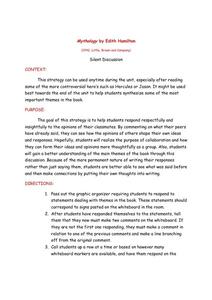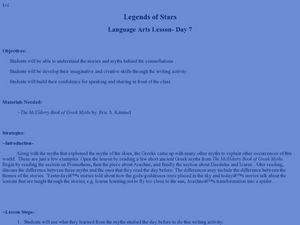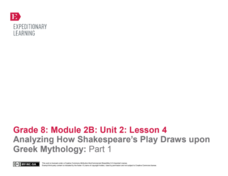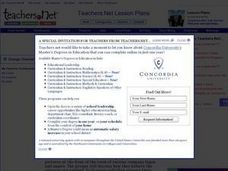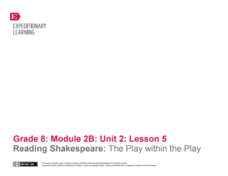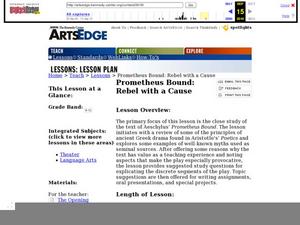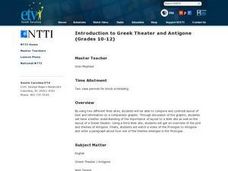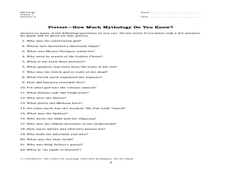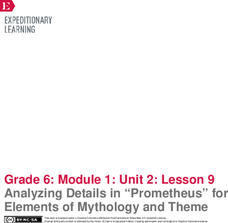EngageNY
Analyzing How Shakespeare’s Play Draws upon Greek Mythology: Part 2
Pupils explore the narrative structure of a piece of literary text, mapping out the plot structure of the Greek myth "Pyramus and Thisbe." Next, they use their completed graphic organizers to write story summaries.
Curated OER
The Legendary Raptors
How are raptors and airplanes alike? Combine science and language arts in this fun and interactive project. Young scientists research the animal in order to design their own aircraft, and compete in a contest for farthest, fastest, and...
Curated OER
Greek Mythology Character Cubes
Students research Greek myths and identify characters from ancient Greece. After discussing the names, descriptions, scenes an objects in Greek mythology, they draw pictures on tiles and write descriptions. Students join the tiles...
Curated OER
Greek Mythology: Cultures and Art
Students examine literary arts. In this Greek mythology lessons, students read Greek myths and select characters from the myths to study. Students create watercolor illustrations of the characters, write short stories about the...
Curated OER
Mythology by Edith Hamilton: Silent Discussion
Get everyone up and participating! High schoolers reading Mythology, by Edith Hamilton, complete a graphic organizer independently, and then record one of their thoughts on the white board for a silent discussion. Decide how you're going...
Curated OER
Legends of Stars
After choosing a figure from Greek mythology, middle schoolers design, draw, and color a constellation to represent that person. Additionally, they create a story to tell how the constellation came to be. This lesson is a great addition...
EngageNY
Analyzing How Shakespeare’s Play Draws upon Greek Mythology: Part 1
Scholars read the story "Pyramus and Thisbe," analyzing word choice, tone, and meaning. They then try to find the gist of the story and discuss how Shakespeare used the myth in his play A Midsummer Night's Dream.
EngageNY
Analyzing How Shakespeare’s Play Draws upon Greek Mythology: Part 3
How do the narrative and play versions of the myth "Pyramus and Thisbe" affect meaning? Scholars reread Act 5, Scene 1 from Shakespeare's A Midsummer Night's Dream and compare its structure to "Pyramus and Thisbe." Next, they use a...
EngageNY
Determining Theme: Reading Myths in “Expert Groups”
Leave it to the experts. Scholars work in expert groups to analyze new myths. Each group is assigned to become an expert on either The
Fates, The Story of Medusa and Athena, or Theseus and the Minotaur. They answer questions and discuss...
Curated OER
Greek mythology (characteristics and features)
Students recognize the features and characteristics of myths, the role myths played in Greek culture, and choose a writing project. In this Greek mythology lesson, students are introduced to Greek mythology and work in cooperative...
Curated OER
Greek Mythology
Sixth graders investigate the concept of Greek Mythology and conduct research using a variety of resources. They read literature pieces and then write responses to the readings. Students also view a video in order to create the context...
Curated OER
Greek Mythology: All in the Family
Twelfth graders compare/contrast the Greek myth to explain an aspect of nature. They create an explanatory myth about some aspect of nature and design a mythological business card using Microsoft Word.
Curated OER
Impact of Greek Mythology in Today's World
Students explore world logos and names of companies and relate them to Greek myths. Events real and imagined are examined and their effects on later cultures are discussed.
Curated OER
Understanding Greek Mythology
Middle schoolers explore the role of Greek mythology in ancient Greek life. They discuss the origins of the Greek gods and goddesses, conduct Internet research, and present a project in the form of a dialogue between a Greek god and a...
EngageNY
Reading Shakespeare: The Play within the Play
Scholars continue reading the Greek myth "Pyramus and Thisbe," analyzing why it was written into Shakespeare's A Midsummer Night's Dream. Next, they complete a Venn diagram to compare the two texts.
EngageNY
Reading Closely to Build Background Knowledge: “Myths and Legends”
That is a myth! Scholars take a look at Greek myths referenced in The Lightning Thief. As learners listen to stories in Myths and Legends, they imagine the sights and sounds described. Pupils then talk with partners about specific words...
Curated OER
Prometheus Bound: Rebel with a Cause
If you are teaching Aeschylus' Prometheus Bound, you can't afford to miss this source. An extensive list of ideas outlines numerous discussion topics, writing prompts, comprehension questions, oral presentations, and projects. Have class...
EngageNY
Exploring Allusions to Myths in The Lightning Thief: Close Reading Part 1 of “Prometheus”
It's all just an allusion. Scholars learn the meaning of allusion and read an allusion in The Lightning Thief. Learners gather in their triads and discuss questions from the text to take a close look at vocabulary words and choose an...
EngageNY
What Makes a Myth a Myth? Comparing “Cronus” and “Shrouded in Myth”
Scholars complete a Venn diagram to compare and contrast Cronus and Shrouded in Myth. Learners work in their triads to write similarities and differences on sticky notes. They then take a look at the text The Key Elements of Mythology to...
Curated OER
Introduction to Greek Theatre and Antigone
Students compare and contrast a website layout and the layout of a Greek theatre. In this Greek theatre lesson plan, students research the Greek theatre and produce a bulleted list of five facts about the Greek theatre. Students complete...
Curated OER
A Story on a Vase
Young scholars associate a hydria with Greek myths. In this Greek art and mythology lesson, students examine a scene on a hydria, then choose a Greek myth to illustrate on their own painting.
Curated OER
Mythology - What Is It?
Students explore Greek mythology. In this mythology lesson, students discuss and define mythology. Students view pictures and associate them with the correct Greek myth. Students answer trivia questions about their knowledge for mythology.
Curated OER
Magnificent Mythology
Sixth graders research Greek mythology and explore mythological references. In this Greek mythology lesson, 6th graders view a PowerPoint about Greek mythology and read myths and their characteristics. Students discuss the relevancy of...
EngageNY
Analyzing Details in “Prometheus” for Elements of Mythology and Theme
Well isn't that clever? Scholars read Prometheus, a tale describes the clever Greek god and trickster. They tune into details and complete graphic organizers that reveal the theme of the text.
Other popular searches
- Greek Mythology Lesson Plans
- Greek Mythology Project
- Ancient Greek Mythology
- Greek Mythology Unit
- Book Making Greek Mythology
- Greek Mythology Heroes
- Greek Mythology Lessons
- Greek Mythology Art Lessons
- Greek Mythology and Music
- Greek Mythology Word Search
- "Ancient Greek Mythology
- Greek Mythology Art






